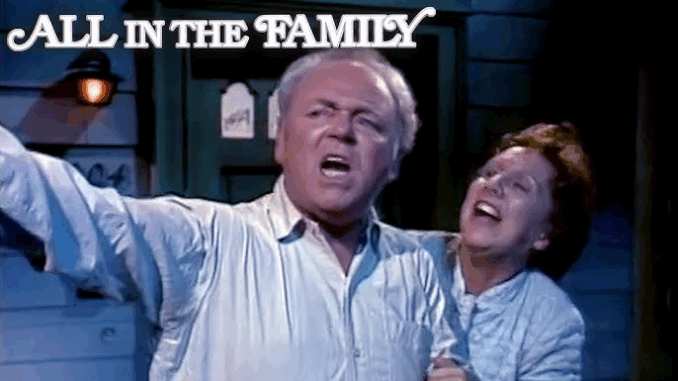
When All in the Family premiered on January 12, 1971, American television was never the same again. Viewers were used to wholesome sitcoms with laugh tracks and mild jokes—but Norman Lear’s bold new series kicked down the door of tradition. It was raw, political, and brutally honest. The public reaction was immediate—and explosive.
A Divided Audience: Love It or Hate It
From the very first episode, All in the Family polarized audiences. Some viewers were captivated by the show’s willingness to address real-life issues like racism, sexism, and war. Others were shocked and even outraged by the language and subject matter.
CBS reportedly received thousands of letters in the first weeks, many from angry viewers who found the show offensive, particularly Archie Bunker’s unapologetic bigotry. However, an equally large number praised the network for airing a program that “finally talked about things the way they really are.”
It wasn’t just a sitcom—it was a social experiment unfolding on national television.
A New Kind of Comedy That Made People Uncomfortable
Archie Bunker was a character unlike any in sitcom history. Many viewers were unsure whether they were supposed to laugh at him or be appalled by him. Some feared that his views were being normalized, while others argued that the show was actually exposing prejudice in a way that encouraged viewers to think critically.
Norman Lear always made it clear: Archie wasn’t meant to be admired—he was meant to reflect the ugliness that society too often swept under the rug.
This ambiguity sparked passionate debate at dinner tables, in newspapers, and even in churches. For many, All in the Family was the first time television forced them to confront uncomfortable truths.
Media Critics Were Equally Torn
Television critics of the early 1970s were just as divided as the public. Some hailed the series as a “breakthrough in American television” for daring to show working-class life in all its complexity. The New York Times called it “a breath of fresh air,” while others slammed it as “vulgar,” “dangerous,” and “inappropriate for family viewing.”
Despite—or because of—this controversy, All in the Family drew massive ratings. By the end of its first season, it was one of the most talked-about shows in the country.
Changing Minds Over Time
Interestingly, many viewers who initially disliked the show eventually came around. As episodes aired and the characters developed, audiences began to understand the show’s deeper purpose. Archie was not just a loudmouth—he was a flawed human being navigating a world that was changing faster than he could understand.
By its third season, All in the Family had become the number one show in America—a spot it held for five consecutive years.
Legacy of the Audience Response
The initial reactions to All in the Family are now seen as proof of its cultural power. It pushed boundaries, forced conversations, and made people feel something. Whether that feeling was discomfort, anger, or admiration, it proved that television could be more than mindless entertainment—it could be transformative.
Conclusion
The audience reaction to All in the Family in the 1970s was loud, emotional, and deeply divided. But that’s exactly what made it so important. Norman Lear didn’t set out to please everyone—he set out to tell the truth. And in doing so, he sparked a national conversation that is still relevant today.
